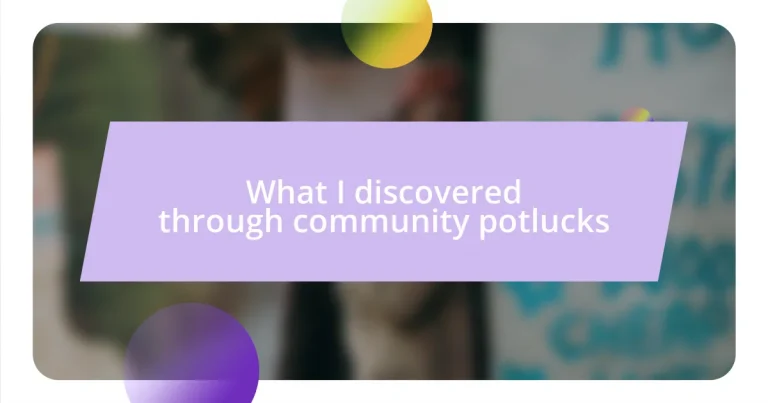Key takeaways:
- Potlucks foster community by encouraging connection through shared meals, storytelling, and culinary diversity.
- Inclusive invitations that consider dietary restrictions and welcome all skill levels enhance participation and create a sense of belonging.
- Sharing personal dishes leads to spontaneous conversations, deepening relationships and transforming attendees into a connected community.
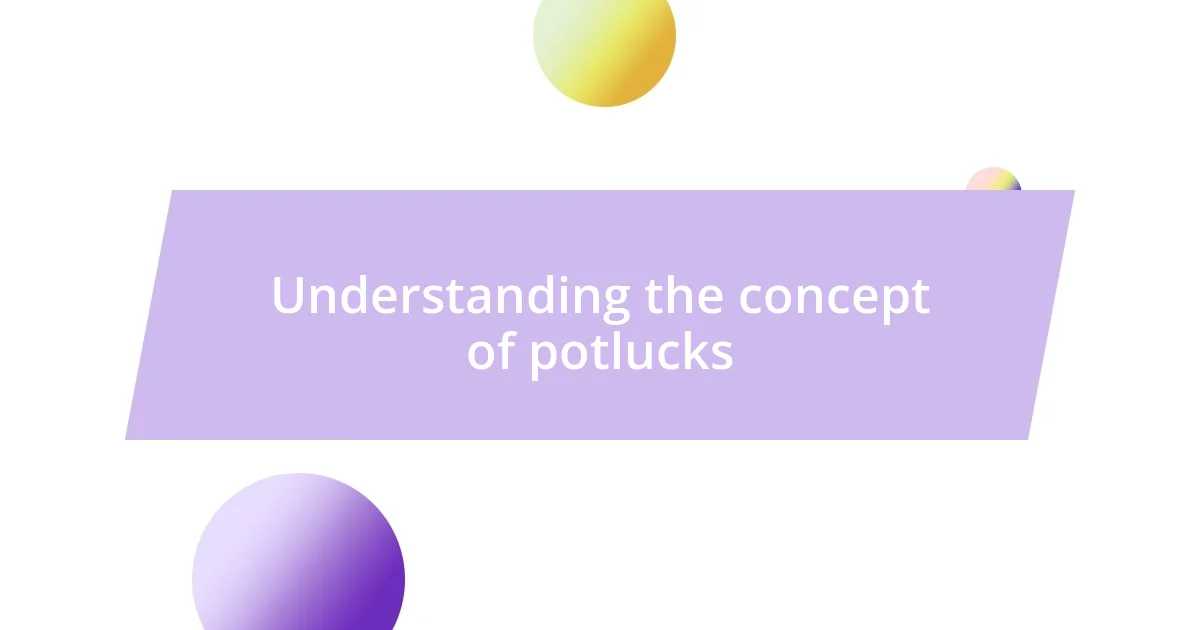
Understanding the concept of potlucks
Potlucks are fascinating social gatherings where each participant contributes a dish, creating a delightful tapestry of flavors and stories. The beauty of potlucks lies in their simplicity; anyone can join in. It’s a way for people to share not just food but also heritage and creativity. Have you ever tasted a dish that instantly brought back memories of family gatherings? That’s the magic of what potlucks can evoke.
I’ve often found myself at potlucks where, at first glance, the table can feel overwhelming, packed with dishes from various culinary backgrounds. Each container has its own narrative. One memorable experience was the time I came across a tangy tamale dish prepared by a neighbor who shared tales of her grandmother’s recipes, creating an instant connection not just through food but through shared history.
These gatherings also foster a sense of community that feels increasingly rare in our fast-paced lives. When we break bread together, we’re not just sharing a meal; we’re weaving bonds with threads of laughter, stories, and sometimes even a little bit of healthy competition over whose dish reigns supreme. Isn’t it interesting how a simple potluck can turn into a celebration of our differences while highlighting the commonality of our human experience?
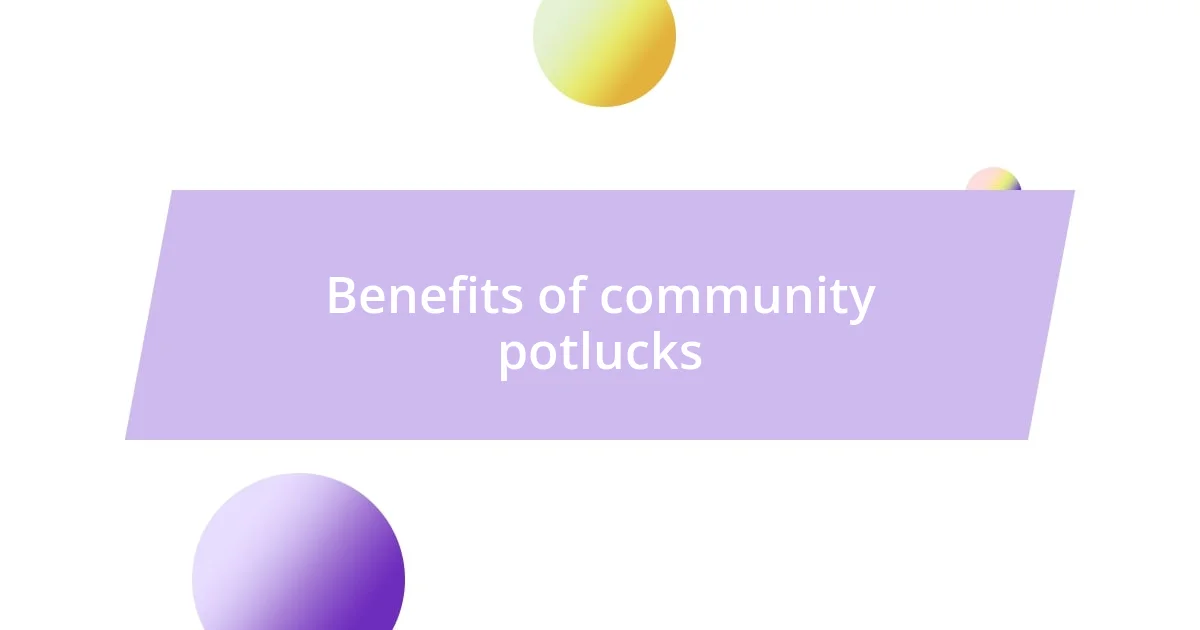
Benefits of community potlucks
The benefits of community potlucks extend far beyond just sharing food. From my own experiences, I’ve seen how these gatherings become an excellent opportunity for conversation and connection. I remember one evening, standing in line as the delicious aroma of various cuisines wafted through the air, and striking up a lively discussion with a fellow attendee about our favorite recipes. It’s those spontaneous conversations that often lead to new friendships, making the community feel more like a family.
Furthermore, potlucks encourage culinary creativity while allowing individuals to showcase their cooking skills. I once brought a family recipe that always sparked conversations—it was a twist on traditional mac and cheese that caught everyone’s attention. Sharing dishes like this not only highlights personal creativity but also invites guests to step out of their comfort zone, trying things they may not have tasted otherwise. You can’t help but feel a sense of pride presenting something you’ve lovingly prepared while also cheering on others for their unique contributions.
Additionally, potlucks promote a more inclusive atmosphere. Everyone, regardless of their cooking abilities or background, can participate. I recall a time when a neighbor, who always felt shy about contributing, surprised us with her famous chocolate cake. Seeing her joy as people enjoyed her dish was heartwarming. It reinforces the idea that everyone has something valuable to share, fostering a strong sense of belonging within the community.
| Benefits | Description |
|---|---|
| Social Connections | Encourages conversation and friendships among attendees. |
| Culinary Creativity | Allows individuals to showcase their cooking skills and share personal recipes. |
| Inclusivity | Invites everyone to participate, regardless of skill level, promoting a sense of belonging. |
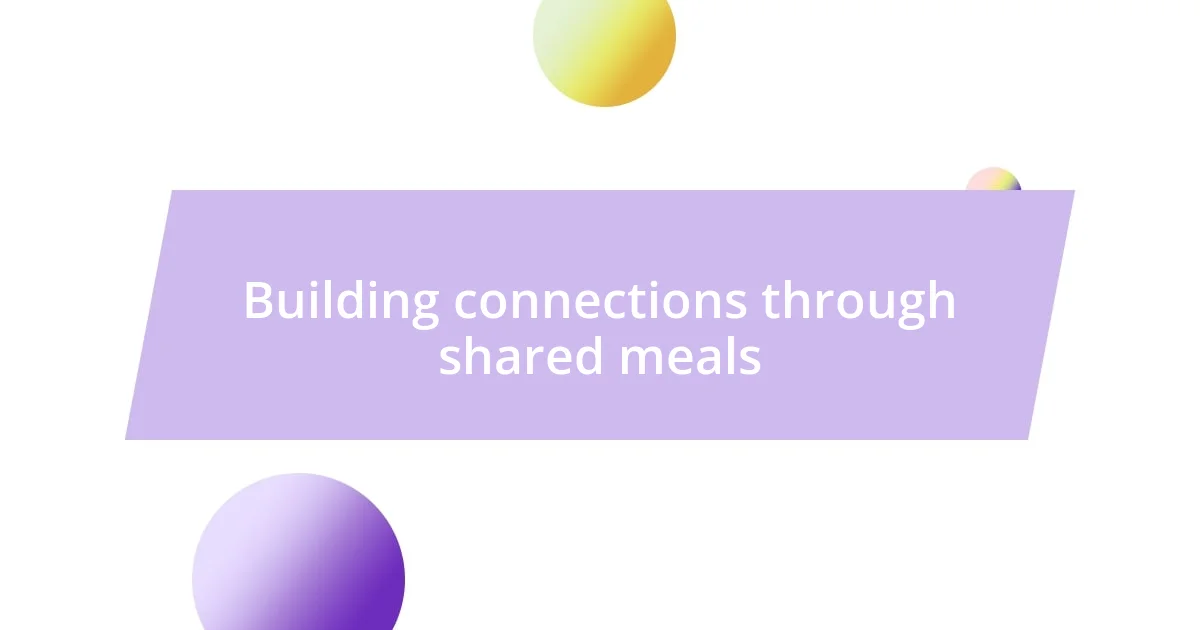
Building connections through shared meals
Gathering around a table laden with an array of dishes creates an atmosphere thick with possibilities. I still remember the time a few friends and I hosted a potluck to welcome new neighbors. As we set the table, I couldn’t help but feel a mix of excitement and nerves. That feeling melted away when we all started sharing stories behind our dishes. Suddenly, we weren’t just individuals from different backgrounds; we were friends connected by not only food but the laughter and stories we exchanged.
- Conversations sparked by a single dish can lead to heartfelt connections.
- Sharing personal recipes encourages storytelling, deepening the bond between participants.
- The raw joy of sampling different foods fosters a sense of adventure and curiosity in relationships.
With each potluck, I often notice a shift in dynamics. Attendees transform from strangers into participants of a communal experience. One potluck stands out in my memory. There was a guest who brought a traditional dish from her homeland, and as she shared its history, you could see the warmth and pride radiating from her. People leaned in closer, captivated. It struck me how powerful it is to connect through shared meals—food not only fills our stomachs but also serves as a bridge, linking us to one another in ways that words alone often cannot.
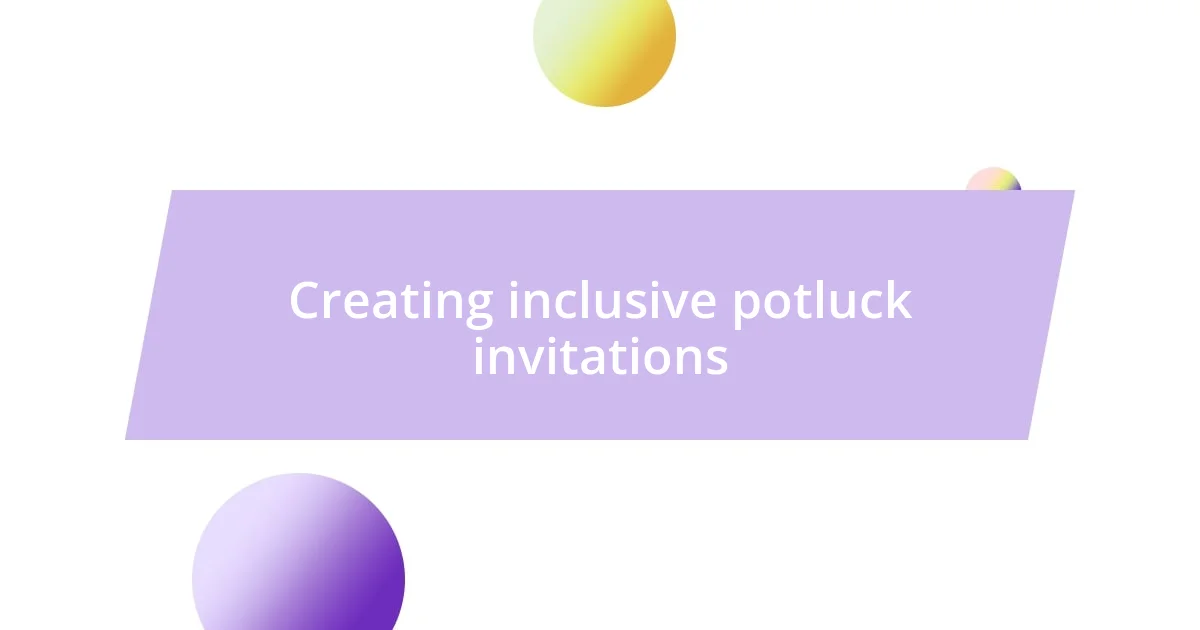
Creating inclusive potluck invitations
Creating inclusive invitations for potlucks is the first step in ensuring everyone feels welcome. I’ve found that clearly stating that everyone is invited—regardless of cooking skills or dietary restrictions—makes a significant difference. One of the best invitations I sent out included a note encouraging guests to bring any dish that resonates with them, whether homemade or store-bought. It felt joyful watching people respond with excitement, sharing not just what they were bringing but also the stories associated with their chosen dishes.
Another important aspect is providing options for various dietary preferences. I once faced a situation where a guest mentioned having a gluten allergy, which surprised me since I hadn’t considered it initially. After that experience, I started including a section on dietary needs in my invites. This small adjustment allowed everyone to feel safe and included. It’s uplifting to see how thoughtful invitations can inspire guests to participate confidently, knowing they’ll find choices that suit them.
Lastly, I always encourage guests to RSVP, which helps me gauge how many might attend and what dishes they plan to bring. One time, I set a theme for the potluck based on seasonal ingredients, which excited everyone and led to a diverse spread. By asking for RSVPs and dish ideas, you not only organize better but also foster a sense of anticipation. This way, the potluck feels like a collective endeavor where each person contributes to something special. Could there be a better way to cultivate community?












